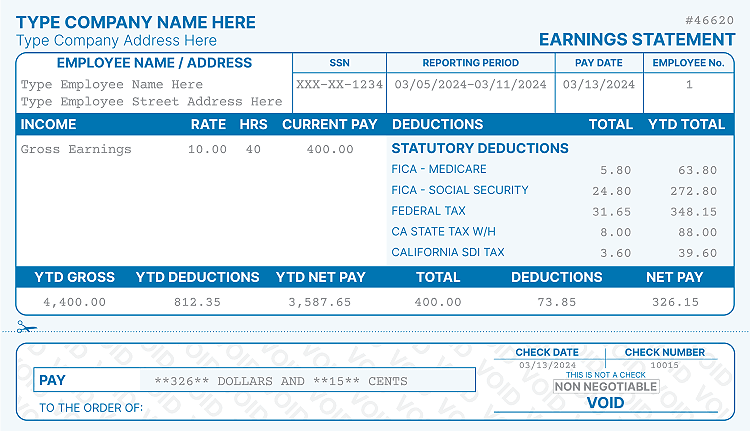1099-MISC & 1099-NEC Tax Forms – When to File Each
Tax season can be a challenging time for small business owners, freelancers and independent contractors. Using an online check stub maker to generate pay stubs certainly makes things easier when it comes to record-keeping. However, you also need to navigate the intricacies of tax forms, which can be complex – especially when the requirements keep changing.
If you're familiar with the 1099-MISC form, you may be surprised to learn that the IRS introduced a new form in 2020 – the 1099-NEC – which has caused some confusion and raised questions among taxpayers.
Understanding the distinctions between these two forms is essential for accurately reporting income and deductions, and meeting your tax obligations. So, in this article, we will delve into the differences between the two, providing you with the knowledge you need to ensure compliance when it comes to reporting your expenses.
What Are the 1099 Forms?
The 1099 tax forms are used to report various types of income received by individuals, businesses, and other entities. Essentially, these forms are used to report income that is not earned through traditional employment.
There are several different types of 1099 forms, each designated for reporting specific types of income. Some common examples include:
- 1099-MISC: This form is used to report miscellaneous income that is not subject to self-employment tax, including rent and royalties.
- 1099-INT: This form is used to report interest earned from bank accounts, loans, or other financial investments.
- 1099-DIV: This is used to report dividends received from stocks, mutual funds, or other investments.
- 1099-B: This is used to report proceeds from the sale of stocks, bonds, or other securities.
- 1099-R: This form is used to report distributions from retirement plans, pensions, annuities, or other similar accounts.
But what about 1099-NEC?
What is Form 1099-NEC?
Form 1099-NEC is used to report nonemployee compensation that is subject to self-employment tax (NEC stands for "Nonemployee Compensation").
This compensation refers to any payments made to individuals or entities who are not considered employees but provide services to a business or organization, including independent contractors, freelancers, and self-employed individuals. The IRS introduced this form in 2020 – before that, this income was reported using Form 1099-MISC.
The form must be completed for any self-employed persons to whom you’ve paid at least $600 within the given tax year. You will need to submit one copy to the IRS and one to the individual – they can then use it to help them complete their tax returns. (Every individual or entity that receives 1099-NEC must also be sent Form W-9.)
The form is due on 31st January for the previous calendar year. In some cases, you can file the form electronically.
Each Form 1099-NEC should include:
- The non-employee’s name, address, and tax identification number (TIN)
- The amount of taxable income paid to them within the tax year
- The amount of income tax withheld, if applicable (state or federal)
- Your business name, address and TIN
While you wouldn’t usually withhold tax for non-employees, you may need to report backup withholding if they are subject to backup withholding rules. This is not a common occurrence and you should be notified if you need to withhold such payments for an individual.
What is Form 1099-MISC?
As mentioned, Form 1099-MISC is used to report expenses that are not subject to self-employment tax. Businesses must file this form for every individual or entity to whom they have paid:
- $10 or more in royalties or broker payments in lieu of dividends or tax-exempt interest.
- At least $600 in:
- Rents
- Prizes, awards, and other compensation not subject to self-employment tax
- Medical and health care payments
- Crop insurance proceeds
- Cash payments for fish purchased from anyone in the business of catching fish. (This applies to any type of aquatic life. )
- Payments to an attorney
- Fishing boat proceeds
- Cash paid from a notional principal contract to an individual, partnership, or estate.
If you regularly reimburse a contractor for supplies or items purchased for clients, you need to report these on Form 1099-MISC as well, as they’re not subject to self-employment tax.
Information to include on the form:
- The TIN of the recipient of the payment
- Their personal information i.e., name, address and Social Security Number (or Employer Identifier Number if it’s a business).
The deadline for this form is also 31st January.
Form 1096
Note that if you complete Forms 1099-NEC and MISC on paper, you’ll also need to file Form 1096. This form provides information about the different returns you’ve filed and are required for the following categories of forms:
- 1097
- 1098
- 1099
- 3921
- 3922
- 5498
- W-2G
You have to complete a separate Form 1096 for each type of form you’ve filed. For example, if you file both 1099-NEC and MISC, you have to complete one Form 1096 for each.
Exceptions
There are some scenarios in which payments do not need to be reported. These include payments made to corporations, including limited liability companies (LLCs) treated as corporations. However, there are some exceptions, such as payments for legal services (reported on Form 1099-NEC) or payments for medical or health care services (reported on Form 1099-MISC).
Another exception is when payments are made through a third-party network, such as credit card transactions or payment processors like PayPal. In such cases, the payment processor is responsible for reporting those transactions on Form 1099-K.
Keep in mind that these exceptions are general guidelines and may not cover all possible scenarios, so it's always recommended to consult the IRS guidelines or a tax professional to ensure compliance with the most current regulations.
Summary
Understanding the differences between Form 1099-MISC and Form 1099-NEC is crucial for accurately reporting expenses and meeting tax obligations.
While Form 1099-MISC is used to report various types of income not subject to self-employment tax, Form 1099-NEC specifically reports nonemployee compensation subject to self-employment tax.
Exceptions to reporting on these forms exist, such as payments to corporations and transactions processed through third-party networks. Consulting IRS guidelines or a tax professional is advisable for precise compliance.
To keep accurate records of payments to employees and contracts, try our instant paystub generator and generate stubs within seconds!

